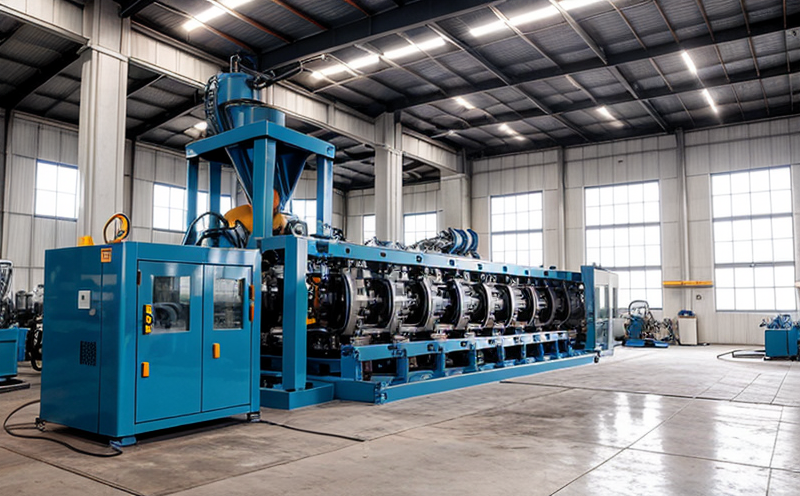JIS B7721 Bolt Performance Testing in Machinery
The JIS B7721 bolt performance testing standard is a critical component of quality assurance processes within industrial manufacturing and processing sectors. This test evaluates the tensile strength, proof load, and other mechanical properties of bolts used in machinery. The standard ensures that bolts meet stringent requirements for reliability, safety, and durability under various operating conditions.
The JIS B7721 bolt performance testing is particularly essential in industries such as automotive, aerospace, construction, and manufacturing where the integrity of fasteners directly impacts product quality and operational efficiency. By adhering to this standard, manufacturers can ensure that their products meet international quality benchmarks and comply with regulatory requirements.
The test methodology involves subjecting bolts to specific loading conditions designed to simulate real-world usage scenarios. This includes static tensile tests to determine the maximum load a bolt can withstand before failure and proof load testing to assess its resistance under lower stress levels without permanent deformation. The results are then compared against specified limits outlined in JIS B7721.
Proper specimen preparation is crucial for accurate test outcomes. Before undergoing JIS B7721 testing, bolts must be cleaned thoroughly and inspected visually for surface defects such as cracks or burrs. Specimens should also comply with the dimensional tolerances specified by the standard to ensure consistent performance across all samples.
The testing equipment typically includes high-capacity tensile testers capable of applying precise loads while monitoring displacement and force. Data acquisition systems capture critical parameters during tests, allowing for detailed analysis post-experimentation. Compliance with JIS B7721 ensures that manufacturers produce reliable products suitable for demanding environments where even minor failures could lead to catastrophic consequences.
The importance of this test cannot be overstated in ensuring the safety and longevity of machinery components. Non-compliance can result in premature failure, increased maintenance costs, and potential hazards. By incorporating JIS B7721 bolt performance testing into their quality control protocols, companies demonstrate a commitment to excellence and customer satisfaction.
Moreover, adherence to this standard enhances brand reputation by demonstrating expertise in maintaining high-quality standards. It also facilitates smoother supply chain operations through consistent product specifications across different suppliers. Overall, JIS B7721 bolt performance testing is an indispensable tool for any company seeking to produce robust machinery parts that meet international quality benchmarks.
Understanding the nuances of this test helps stakeholders appreciate its significance in maintaining operational excellence and compliance with regulatory standards.
Benefits
JIS B7721 bolt performance testing offers numerous advantages to manufacturers and end-users alike. Firstly, it enhances product reliability by confirming that bolts perform as expected under specified loading conditions. Secondly, the test promotes safety by identifying potential weaknesses in design or manufacturing processes early on. Thirdly, compliance with JIS B7721 improves brand reputation among consumers who value quality assurance.
Additionally, this testing method supports regulatory compliance across various industries, ensuring that products meet stringent international standards. Lastly, it streamlines supply chain management by providing consistent performance metrics for all involved parties. These benefits underscore why manufacturers should prioritize JIS B7721 bolt performance testing as part of their quality assurance protocols.
Why Choose This Test
- Ensures Compliance: Adhering to JIS B7721 guarantees conformity with international standards, enhancing market access and regulatory compliance.
- Enhances Reliability: The test identifies potential issues early on, ensuring that bolts perform reliably under real-world conditions.
- Promotes Safety: By detecting defects or weaknesses in design/mfg processes, this testing method minimizes the risk of accidents and failures.
- Bolsters Reputation: Demonstrating adherence to high-quality standards can significantly improve a brand's image among consumers.
These factors make JIS B7721 bolt performance testing an essential part of any manufacturer’s quality assurance process, ultimately leading to more robust and dependable machinery parts.
Quality and Reliability Assurance
The JIS B7721 bolt performance test plays a pivotal role in ensuring that bolts used in industrial machinery meet the highest standards of quality and reliability. This is particularly important because the integrity of fasteners directly impacts the overall performance, safety, and longevity of complex mechanical systems.
During testing, bolts are subjected to various loading conditions designed to mimic actual operational scenarios. The primary objective is to evaluate their tensile strength, proof load capacity, and other relevant mechanical properties under controlled environments. This process ensures that each bolt adheres to the specified limits outlined in JIS B7721.
Proper specimen preparation is crucial for accurate test outcomes. Before undergoing JIS B7721 testing, bolts must undergo rigorous cleaning procedures followed by careful visual inspections to detect any surface defects such as cracks or burrs. Compliance with dimensional tolerances further ensures consistent performance across all samples. Once prepared, these specimens are ready for loading into high-capacity tensile testers equipped with precise load application and displacement monitoring capabilities.
Data acquisition systems capture critical parameters throughout the testing process, including applied force, displacement, and peak loads experienced by each bolt specimen. These data points provide valuable insights into how well each sample performs under specified conditions, enabling manufacturers to identify any discrepancies between actual performance and expected outcomes based on JIS B7721 specifications.
The results of these tests are meticulously documented and analyzed to ensure compliance with international standards. Any deviations from acceptable limits indicate areas where improvements can be made either in material selection or manufacturing processes. This information helps manufacturers refine their production methods continuously, resulting in higher-quality products that better meet customer expectations.
By incorporating JIS B7721 bolt performance testing into their quality control protocols, companies demonstrate a commitment to excellence and customer satisfaction. They also enhance brand reputation by showcasing expertise in maintaining high-quality standards. Additionally, this approach supports regulatory compliance across various industries, ensuring products meet stringent international benchmarks. Overall, JIS B7721 bolt performance testing is an indispensable tool for any company seeking to produce robust machinery parts that meet international quality standards.





